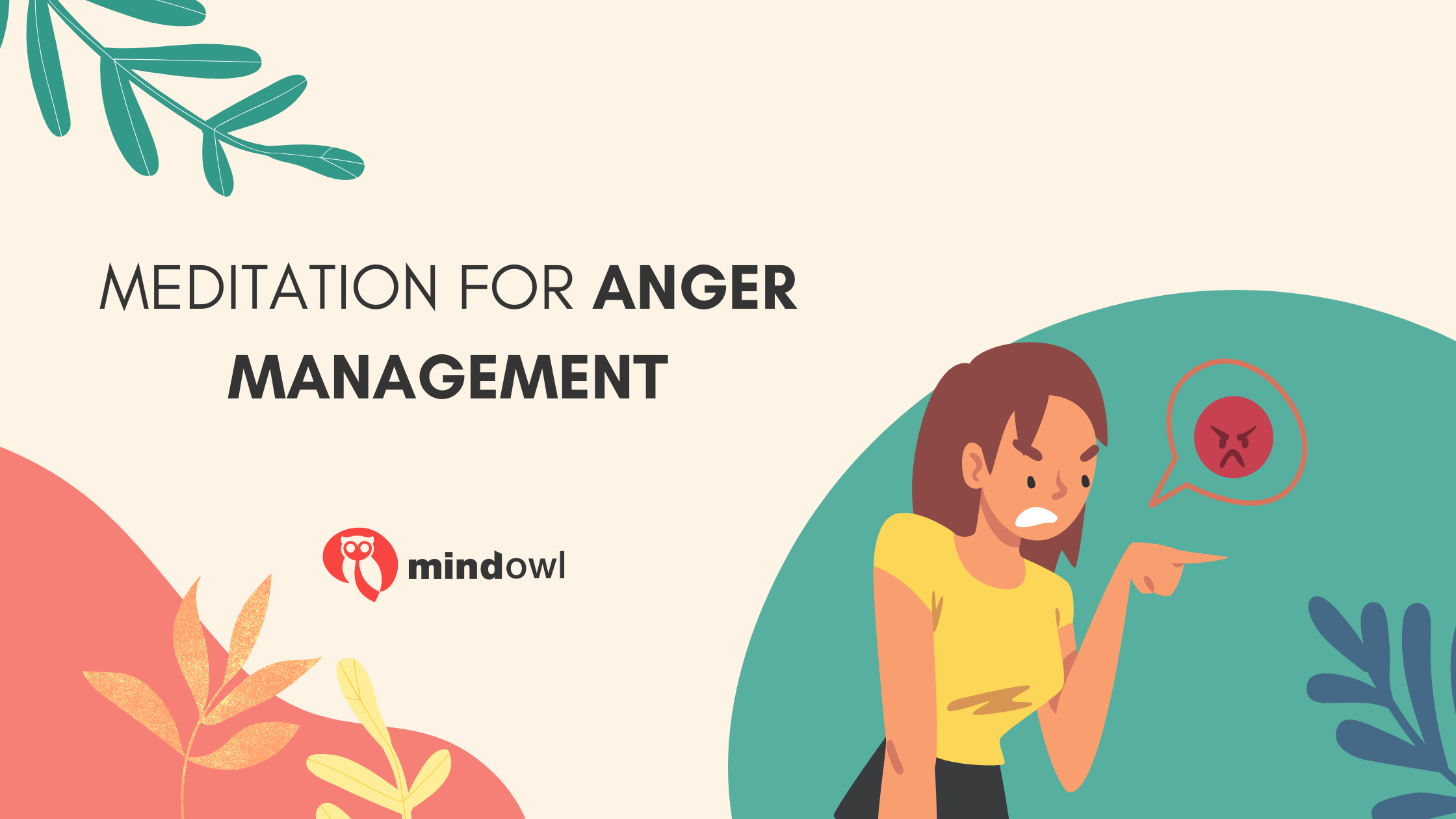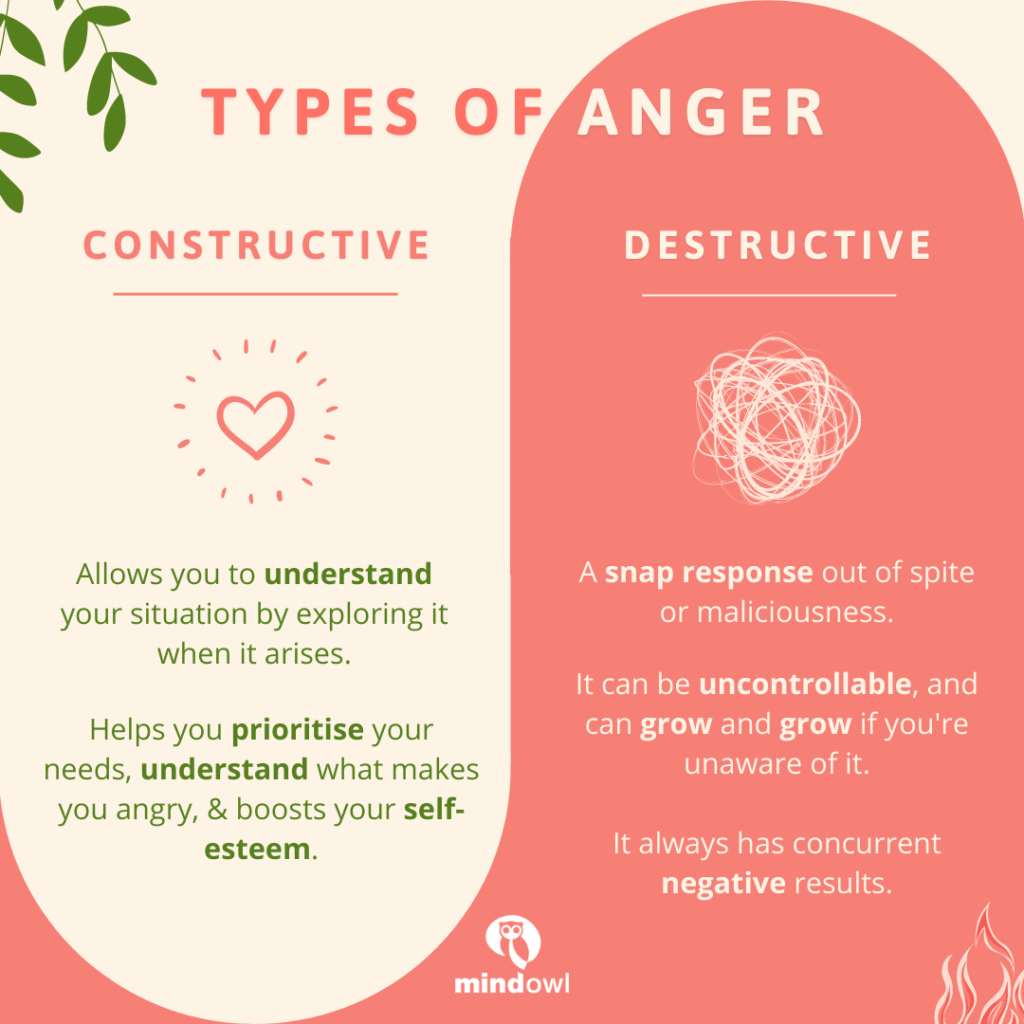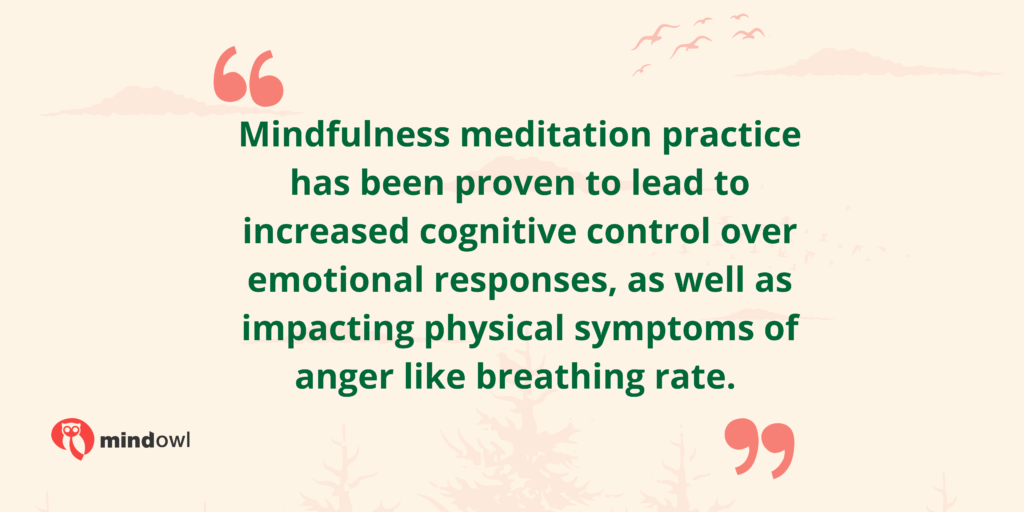Practising mindfulness can help us realise that anger need not be a problem. Anger is something that most people experience at least once or twice a day. It can arise if you feel like things aren’t going your way, or as though someone is trying to take advantage of you. Sometimes, you may experience an emotional reaction that seems impossible to get rid of; but the truth is, there are many different ways to deal with anger.
Anger is often considered a negative emotion, but what if we could learn to use it? What would happen if we could let go of that anger and instead take time to reflect on why it has arisen, before learning how to manage and resolve the issue? This blog post will explore the concept of anger and show how both daily mindfulness and formal meditation practice can help us become more aware of our emotions, thereby allowing us to deal with them better.
What Anger Does To The Body
Anger is an emotional state. It can vary largely in intensity from a mild, irritating state to a full-blown episode of fury and rage. Generally speaking, the milder state of anger isn’t harmful — this is a very normal emotion that we experience regularly throughout our lives. Mild anger is an organic, natural psychological response to what our brain perceives as threats. However, as we move further up the scale, anger begins to have a more significant impact on the body.
When we experience rage and fury, our bodies show a myriad of physical responses. First, the body releases the chemical adrenaline, which causes the muscles to tighten and our heart rate to increase, which in turn increases our blood pressure. Our breathing rate also quickens measurably, and as an accumulation of all these bodily responses, the body releases the stress hormone known as “cortisol”, which puts a strain on our nervous system.
Other physical symptoms of anger include shortness of breath, a tight chest, heart palpitations, and sweating. These physical responses are part of the fight-or-flight response, which is designed to prepare us to deal with a threat. However, these physical reactions can sometimes cause us to overreact. For example, if someone cuts us off in traffic, we might react with anger rather than calmly assessing the situation. Instead of getting mad, we could choose to simply acknowledge the person’s behaviour and let it pass without reacting.
It’s worth also noting that it’s not just short-term responses that are affected by anger; those who are easily angered are more likely to develop hypertension and coronary heart disease from high blood pressure, according to one scientific study. Clearly, the physical effects of anger can be highly detrimental.
How Does Anger Affect Your Brain?
It’s also important to consider what happens in the brain during these moments. The frontal lobe of the brain is the section of the brain that handles our reasoning. The constant flow of adrenaline and mental stress caused by anger increases unthoughtful impulse responses in this area, making it difficult to think clearly.
Anger is also often accompanied by negative self-talk. Negative self-talk refers to unhelpful thoughts related to who we are and what we deserve. For example, if you’re angry with your partner because he forgot to pick up milk from the shop, you may tell yourself, “He doesn’t care about me”, or “He never thinks about me”. Such statements lead to feelings of shame, guilt, and low self-worth. Engaging in positive self-talk can help us counter this by highlighting our qualities and skills.

What Are The Different Types of Anger?
Okay, so excessive anger can cause us problems; however, anger can also be helpful at times. Emotions are our body’s fundamental way of conveying information to us, sometimes expressed through a physical reaction. Some emotions may feel uncomfortable and negative, but they serve an important function. Our emotions and feelings of anger tell us things about our environment, prepare us for upcoming scenarios, and shape our life experiences. Anger, for example, is often our body’s way of telling us when things have become out of control.
There are two main types of anger, constructive and destructive. As you’d expect, the latter type is the one we should make efforts to manage and prevent. Let’s take a closer look at both forms of anger.
Constructive Anger
This is a type of anger that allows you to understand your situation by exploring it when it arises. If channelled in the right way, constructive anger can help you prioritise your needs, understand what makes you angry, and ultimately boost your self-esteem. Let’s say your friend and colleague at work missed an important one-to-one meeting with you. A response of constructive anger can allow you to identify what has angered you and become motivated to discuss and resolve this situation with your friend.
Destructive Anger
This appears as a snap response out of spite or maliciousness. It can be uncontrollable, and it can grow and grow if you’re unaware of it. Alternatively, trying to suppress or avoid destructive anger can often worsen it in the long run. However short-lived the moment of destructive anger, it always has concurrent negative results.
When you experience anger in a constructive way, you uphold the respect you have for yourself, while also upholding the respect you have for the people around you or the person you are in conflict with. Constructive anger also allows you to express why you are upset and reach a constructive solution with efficiency.
How does meditation and mindfulness help with anger?
Meditation has been proven to reduce stress levels, boost self-esteem and reduce feelings of anxiety and depression. The purpose of meditation varies depending on the individual; however, perhaps one of the most beneficial uses of mindfulness meditation is for anger management.
Experienced meditators can attest to the long-term help meditation exercises can provide when it comes to changing your response to anger from a destructive one to a constructive one. Mindfulness meditation practice has been proven to lead to increased cognitive control over emotional responses, as well as impacting physical symptoms of anger like breathing rate. Studies have shown that those who embrace meditation as part of their daily life develop a non-judgemental perspective towards themselves, others, and to experiences.
Mindfulness causes us to get better at harnessing the power of our executive functioning, exercising our cognitive control to stop exhibiting unhelpful and unwanted behaviour in stressful or anger-inducing circumstances. It’s not just that meditation increases ethical behaviour; it also prevents meditators from arguing, harming or mistrusting others when they normally would. Researchers have found that meditation training doesn’t change participants’ ability to resist impulsive thoughts. Instead, they suggest that meditation simply helps reduce the urge to act impulsively by changing how we perceive our impulses. Meditation can also help us understand our emotions and motivations better so that we can make better decisions and avoid acting impulsively. For more on how mindfulness can enhance your daily experiences, check out our article on how to use mindfulness to stop procrastinating.
We discussed earlier how anger affects your brain. Meditation counteracts this process by causing a reduction in the size of the amygdala, the region of the brain responsible for fear, stress and anger. Mindfulness has the power to seriously impact brain activity and reduce emotional reactivity — we just need to know how to use it.
Breathing Exercises
It’s often easy to notice when anger arises, but it can be hard to notice when it leaves you. To help yourself notice when anger has passed, take note of your breathing. Breathing exercises can be a way of regulating your anger, like a barometer that gauges how high it is and allows you to bring it down. Here’s a quick technique you can try next time you experience anger.
- Breathe out, and as you do so, notice how long it takes for the anger to leave you. It may be as little as two breaths or as many as five.
- If you find yourself still thinking about the situation after five breaths, try taking another five breaths.
- After ten breaths, you may want to try doing a different activity to take your mind off the situation.
How do you meditate to release anger?
Okay, so we’ve explored the science behind anger, and looked at how meditation can tackle severe emotional reactions. We’re now going to run through a short mindfulness meditation script designed to help you notice anger when it arises, and manage it effectively. Let’s go.
- Find a comfortable place to sit, or even lie down. Check in with your body, making sure your hands and feet are resting comfortably and your eyes are resting shut.
- Begin by setting your intention for your practice. Give yourself permission to handle your anger in a healthy and productive way.
- Feel your body being in contact with the chair or cushion underneath it.
- Take deep, diaphragmatic breaths. Deeply fill your lungs with air and exhale fully.
- Now think back to a recent time you experienced anger. Start with something small that you remember clearly, and envision and re-experience what happened, allowing yourself to feel the full strength of that initial emotion.
- Note what rises up within you. As you recall this anger, are you experiencing other negative emotions like fear and sadness? Note that, but try to stay with the original feeling of anger.
- Note where in your body you feel this anger, and allow yourself to explore this sensation. Don’t reject or push away this sensation, investigate the sensation to develop your understanding of where these subtle sensations sit in your body.
- As you investigate the sensation, note whether it increases or decreases in intensity. Does the sensation change? Does it move across your body? Is it red hot, or ice-cold?
- Begin to apply kindness and compassion to this sensation of anger. The emotion of anger is a natural part of life that we cannot avoid.
- Note what happens when you treat your anger with the same compassion and tender care you would show to a small, innocent child.
- Close the session by gently letting go and saying goodbye to the sensation of anger. Do this by bringing attention back to your breath.
- Keep breathing with a deep diaphragmatic breath until you feel your emotional state settle again, letting your breath calm you and heighten your awareness.
- Once you have settled again, notice what sensations are still lingering in your body. Have they changed since you observed them alongside the anger? How did you anger respond to the compassion and kindness that met with it during this meditation?
5 Books About Mindfulness for Anger Management
If you’re searching for further answers about how mindfulness and mindful meditation for anger can help you break free from the constraints of these overwhelming emotions, there are a number of books that will expand your knowledge of the subject.
Long-term meditators and experts in mindfulness for anger management have developed an array of solutions for improving your own emotional and physical health. Here are a few texts that you may find helpful:
- Mindfulness for Anger Management: Transformative Skills for Overcoming Anger and Managing Powerful Emotions, by meditation teacher Stephen Dansiger.
- Beating Anger by Mike Fisher, founder of the British Association of Anger Management.
- Mindfulness & the Art of Managing Anger: Meditations on Clearing the Red Mist, also by Mike Fisher.
- Anger: Wisdom for Cooling the Flames, by Vietnamese Thiền Buddhist monk and peace activist Thich Nhat Hanh.
- Anger Management: The Complete Guide to Overcome Your Anger and Stress Using the Mindfulness Approach, by researcher Simon Grant.
In Conclusion
The mental and emotional health benefits of mindfulness meditation have been clear to experts for a while; regular mindfulness practice can help reduce emotional reactivity, tackle negative feelings, and shine a light on positive emotions.
As we’ve seen, many of these benefits link directly to the reduction of anger, rage, and frustration. By improving our ability to recognise, observe, and manage negative impulses and unhelpful thoughts when they arise, we can prevent ourselves from losing control and acting irrationally or impulsively. It’s important to remember that anger can be constructive, as well as destructive; this fundamental human emotion can help us learn things about ourselves and others, and it can increase efficiency and proactive behaviour at times. We just need to know how to manage it.
Want to find out more about how to cope with anger, frustration, depression, and anxiety? Join our online meditation community and get access to game-changing mindfulness meditation training, tailored to you.
MindOwl Founder – My own struggles in life have led me to this path of understanding the human condition. I graduated with a bachelor’s degree in philosophy before completing a master’s degree in psychology at Regent’s University London. I then completed a postgraduate diploma in philosophical counselling before being trained in ACT (Acceptance and commitment therapy).
I’ve spent the last eight years studying the encounter of meditative practices with modern psychology.




2 thoughts on “Meditation for anger management”